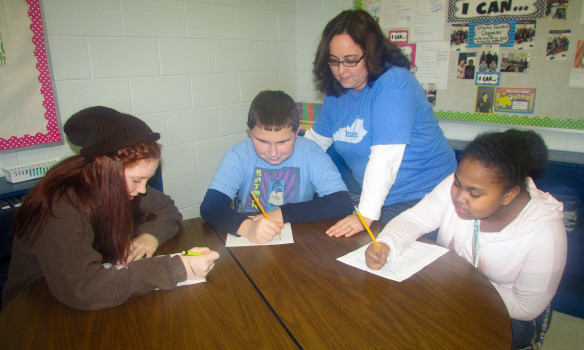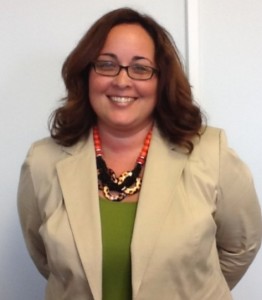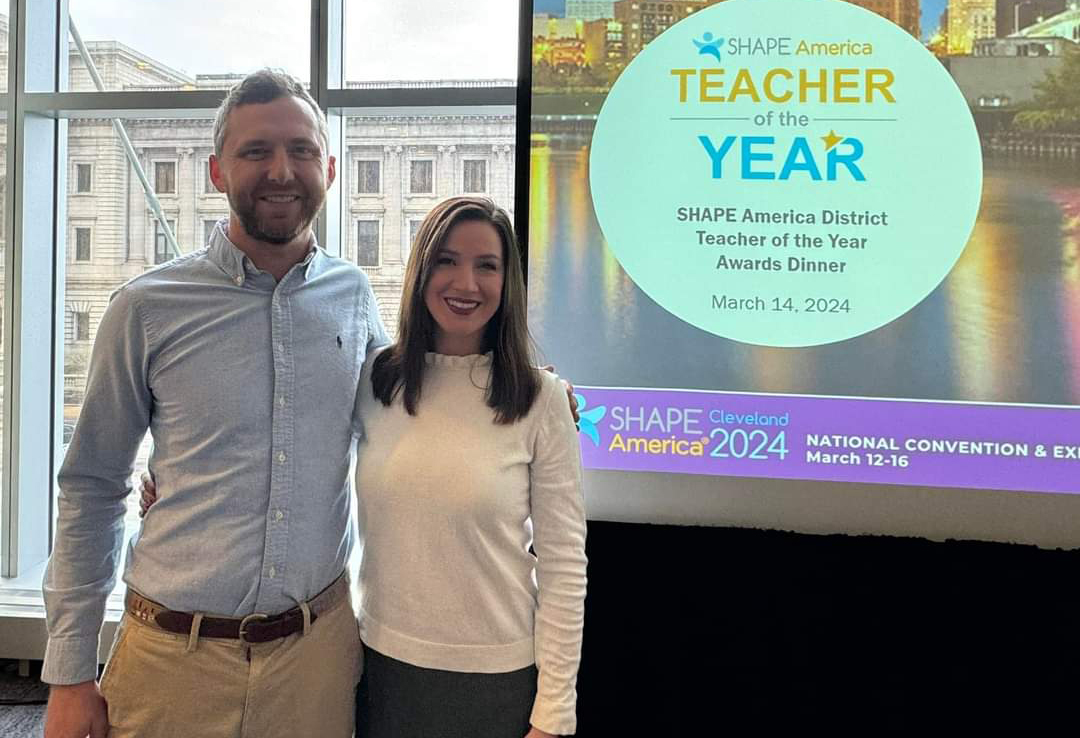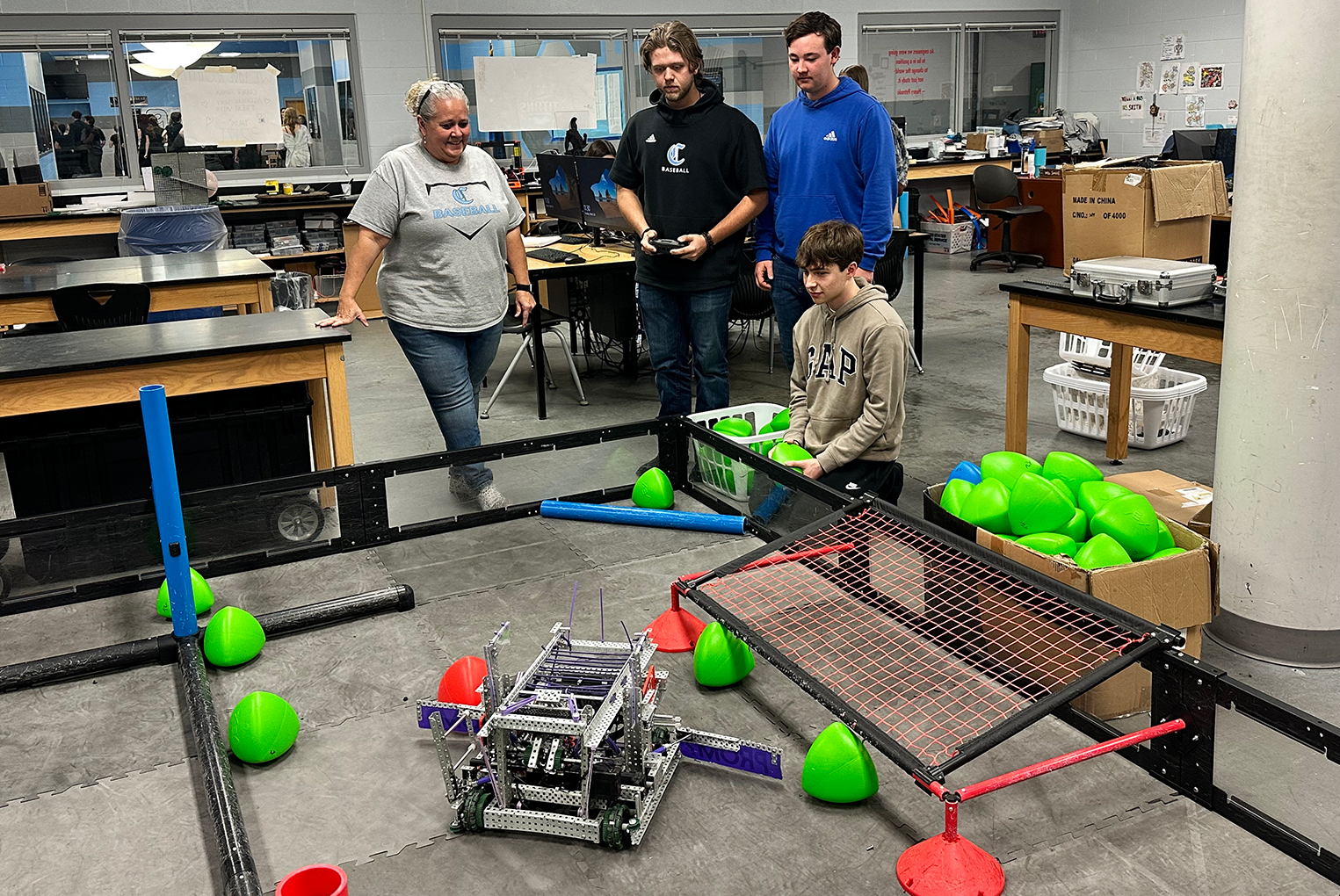
Special Education Teacher of the Year Kelly Teague works with Hayden Gray (center) and his peer buddies Daznee Johnson (left) and Erica Shelton (right) at Muhlenberg North Middle School. Teague created the group to help Gray, who has autism, with social skills.
Photo submitted by Muhlenberg County Schools.
By Brenna R. Kelly
Brenna.Kelly@education.ky.gov
Though Kelly Teague knew she wanted to be a special education teacher since high school, her path took a slight detour.
“Life sometimes takes you in a different direction,” she said, “and I needed to work and support myself.”

Kelly Teague
So Teague worked for several years at a state-run residential facility for troubled youth. As she counseled the teens, Teague learned how learning disabilities and behavioral problems can affect young peoples’ lives.
“I was able to get my feet wet,” she said, “and that made me more interested in doing what I had intended to do from the beginning – become a special education teacher.”
Seven years after reaching her goal, Teague was named the Kentucky Special Education Teacher of the Year by the Kentucky Council for Exceptional Children (CEC) and the Kentucky Department of Education.
Teague, who teaches at Muhlenberg North Middle School, was chosen from three finalist to receive the honor at the CEC Conference in Louisville in November.
“It was very exciting, but also overwhelming,” Teague said, “because if I am a good teacher at all it’s because of the people who have mentored me and the people who have taught me and the people I work with.”
One of those people nominated Teague for the award.
Julie Pendley, director of exceptional children for Muhlenberg County Schools, said Teague first caught her attention when she expressed concern about transitioning special education students from 5th to 6th grades. Teague then assisted Pendley in organizing a professional learning day for the staff.
But most important, Pendley said, is Teague’s ability to build relationships with her students and give them the support they need to succeed.
“She always says that she knows she’s doing her job when she doesn’t have to hold her student’s hands and they are still able to be successful,” Pendley said. “She tries to find ways to encourage and to build in those supports so she can stand back and watch it happen.”
Teague also credits her success with her ability to develop relationships with her students, a skill that is not only important for special education teachers, but also for all teachers.
“It’s important to get to know your kids and get to know their learning styles, but also to get to know them personally and the struggles in their own lives,” she said. “That helps you develop the appropriate strategies for learning.”
Building relationships helps the teacher decide how to teach each student and affects the student’s motivation. Teague said.
“When you have a good relationship with your students, your students want to work harder and try harder,” she said. “That’s the key, because the motivation makes up so much of the success.”
Teague works with students in both a resource setting – where she works with several students at one time – and in a co-teaching setting, where she helps students in their mainstream classrooms. Her students have a range of disabilities, including specific learning disabilities such as in reading or math, mild mental disabilities, behaviors problems and autism.
Because of the wide spectrum, Teague changes her teaching to meet each child’s needs. It’s not much different than teaching students in a typical classroom, said Teague, who graduated from Murray State University and is certified in both special education and elementary education.
“Every child is different anyway. Disability or not, it’s our responsibility for any child in this building to understand them, know how they learn and give them the most appropriate best education we can,” Teague said.
For example, when Teague teaches an autistic student, she uses a strategy that allows nondisabled students to help the autistic students work on social and communication skills.
Teague learned about the Peer Buddy program from the Western Kentucky Educational Cooperative when, as a new teacher, she had her first autistic student.
The idea is to pair the autistic student with several students in his or her classroom or grade, she said. Teague looks for students who have leadership skills, show understanding and a few students who may need a peer buddy themselves. She gets permission from all of the parents before teaching the students about the autistic student’s behavior and needs.
The peer buddies interact with the autistic student during lunch, recess and even during classes. The team meets regularly to go over progress, she said.
Currently, Teague has one autistic student who has six peer buddies as support.
“It’s great because it causes such a ripple effect and a positive atmosphere throughout the whole school,” she said. “All of the sudden other kids are coming to me asking, ‘Can I be a part of this?’”
While working with autistic students is one of her greatest challenges, it’s also her greatest passion and the source of some of her greatest accomplishments, Teague said.
Teague’s teacher of the year honor came with a $500 award, which she promptly donated to the Ray Chumbler IV Autism Scholarship Endowment scholarship at Murray State. The scholarship, named for Chumbler – who was diagnosed with autism at age 13 and graduated from Murray State last year – is given to students on the autism spectrum.
MORE INFO …
Kelly Teague Kelly.Teague@Muhlenberg.kyschools.us
Julie Pendley Julie.Pendley@Muhlenberg.kyschools.us



Leave A Comment